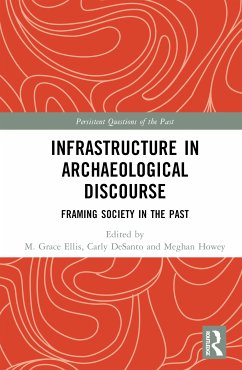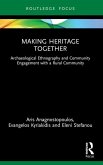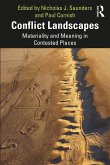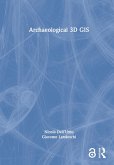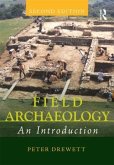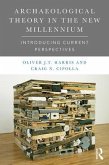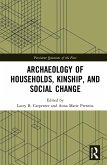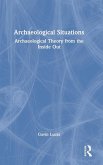Infrastructure in Archaeological Discourse
Framing Society in the Past
Herausgeber: DeSanto, Carly M.; Howey, Meghan C. L.; Ellis, M. Grace
Infrastructure in Archaeological Discourse
Framing Society in the Past
Herausgeber: DeSanto, Carly M.; Howey, Meghan C. L.; Ellis, M. Grace
- Gebundenes Buch
- Merkliste
- Auf die Merkliste
- Bewerten Bewerten
- Teilen
- Produkt teilen
- Produkterinnerung
- Produkterinnerung
This volume expands perspectives on infrastructure that are rooted in archaeological discourse and material evidence.
Andere Kunden interessierten sich auch für
![Making Heritage Together Making Heritage Together]() Aris AnagnostopoulosMaking Heritage Together35,99 €
Aris AnagnostopoulosMaking Heritage Together35,99 €![Conflict Landscapes Conflict Landscapes]() Conflict Landscapes56,99 €
Conflict Landscapes56,99 €![Archaeological 3D GIS Archaeological 3D GIS]() Nicolo Dellâ Unto (Lund University)Archaeological 3D GIS195,99 €
Nicolo Dellâ Unto (Lund University)Archaeological 3D GIS195,99 €![Field Archaeology Field Archaeology]() Peter DrewettField Archaeology38,99 €
Peter DrewettField Archaeology38,99 €![Archaeological Theory in the New Millennium Archaeological Theory in the New Millennium]() Oliver J.T. HarrisArchaeological Theory in the New Millennium62,99 €
Oliver J.T. HarrisArchaeological Theory in the New Millennium62,99 €![Archaeology of Households, Kinship, and Social Change Archaeology of Households, Kinship, and Social Change]() Archaeology of Households, Kinship, and Social Change47,99 €
Archaeology of Households, Kinship, and Social Change47,99 €![Archaeological Situations Archaeological Situations]() Gavin Lucas (Iceland University of Iceland)Archaeological Situations185,99 €
Gavin Lucas (Iceland University of Iceland)Archaeological Situations185,99 €-
-
-
This volume expands perspectives on infrastructure that are rooted in archaeological discourse and material evidence.
Hinweis: Dieser Artikel kann nur an eine deutsche Lieferadresse ausgeliefert werden.
Hinweis: Dieser Artikel kann nur an eine deutsche Lieferadresse ausgeliefert werden.
Produktdetails
- Produktdetails
- Persistent Questions of the Past
- Verlag: Taylor & Francis Ltd
- Seitenzahl: 246
- Erscheinungstermin: 12. März 2024
- Englisch
- Abmessung: 159mm x 242mm x 21mm
- Gewicht: 624g
- ISBN-13: 9781032678436
- ISBN-10: 1032678437
- Artikelnr.: 69482575
- Herstellerkennzeichnung
- Libri GmbH
- Europaallee 1
- 36244 Bad Hersfeld
- 06621 890
- Persistent Questions of the Past
- Verlag: Taylor & Francis Ltd
- Seitenzahl: 246
- Erscheinungstermin: 12. März 2024
- Englisch
- Abmessung: 159mm x 242mm x 21mm
- Gewicht: 624g
- ISBN-13: 9781032678436
- ISBN-10: 1032678437
- Artikelnr.: 69482575
- Herstellerkennzeichnung
- Libri GmbH
- Europaallee 1
- 36244 Bad Hersfeld
- 06621 890
M. Grace Ellis is a doctoral candidate in the Anthropology and Geography Department at Colorado State University and student researcher at the Interdisciplinary Center for Archaeological Research and Evolution of Human Behavior at the University of Algarve. She specializes in landscape archaeology and remote sensing approaches to explore human-environment interactions in the past. Her research examines land use intensification and social interaction in ancient Amazonia, cosmopolitan networks and seafaring across the Caribbean Sea prior to European contact, and neanderthal extinction and human colonization of Iberia. Carly M. DeSanto is a Project Manager at Chronicle Heritage. She obtained her MA in Anthropology from Colorado State University in 2021, which focused on earthen enclosures and monumental construction during the Woodland Period in the Middle Ohio Valley. She specializes in geoarchaeology, archaeogeophysics, infrastructure, earthen monuments, and monumentality. Her current work in cultural resource management focuses on managing archaeological projects in the southwestern United States. Meghan C. L. Howey is currently the Director of the Center for the Humanities at the University of New Hampshire where she is a Professor of Anthropology and in the Earth Systems Research Center. She is an anthropological archaeologist who specializes in colonialism, public archaeology, ethnohistory, landscape, and geospatial analyses. Her current project focuses on the 17th century in the Great Bay Estuary in New England, working collaboratively with regional Indigenous knowledge keepers, community volunteers, and ecologists to explore the lasting socioecological legacies of early colonialism.
1. New Perspectives on Material Infrastructures: Emerging Ideas within
Archaeological Discourse 2. Perspectives: Infrastructure as Relational
3. From the Ground Up: Earthen and Botanical Traces of Biotic
Infrastructures from Ancient Amazonia 4. Indigenous Infrastructure:
Iconography, Dance, and Nomadic Strategy in the Historic Ute (Núuchiu)
World 5. Infrastructure and Interconnectivity in Pre-Columbian Amazonia 6.
Perspectives: Scale of Infrastructure 7. Landscape Infrastructure and Local
Infrastructure: Scales of Intervention in Urban Water Management 8. Desert
Kites: Neolithic Infrastructure in the Margins 9. Perspectives: Historicity
and Temporality of Infrastructure 10. Legacies of Infrastructure in Bronze
and Iron Age China 11. Transportation Systems and Movement Infrastructure:
Evaluating Use, Maintenance, and Modification of Roads at Angamuco,
Michoacan (AD 250-1530) 12. Adena and Hopewell Institutional
Responsibilities and Aging Infrastructure in the Middle Ohio Valley, USA
13. Perspectives: Relevance of the Archaeology of Infrastructure 14.
Agricultural Infrastructure in the Kawaihae Uplands: Ancient Management to
Modern Resilience 15. Consumption or Infrastructure? Theorizing Ceramics in
Ancient Empires 16. Building Meanings as Places: The Archaeology of the
Shellmounds and the Indigenous Infrastructure of the Amazon
Archaeological Discourse 2. Perspectives: Infrastructure as Relational
3. From the Ground Up: Earthen and Botanical Traces of Biotic
Infrastructures from Ancient Amazonia 4. Indigenous Infrastructure:
Iconography, Dance, and Nomadic Strategy in the Historic Ute (Núuchiu)
World 5. Infrastructure and Interconnectivity in Pre-Columbian Amazonia 6.
Perspectives: Scale of Infrastructure 7. Landscape Infrastructure and Local
Infrastructure: Scales of Intervention in Urban Water Management 8. Desert
Kites: Neolithic Infrastructure in the Margins 9. Perspectives: Historicity
and Temporality of Infrastructure 10. Legacies of Infrastructure in Bronze
and Iron Age China 11. Transportation Systems and Movement Infrastructure:
Evaluating Use, Maintenance, and Modification of Roads at Angamuco,
Michoacan (AD 250-1530) 12. Adena and Hopewell Institutional
Responsibilities and Aging Infrastructure in the Middle Ohio Valley, USA
13. Perspectives: Relevance of the Archaeology of Infrastructure 14.
Agricultural Infrastructure in the Kawaihae Uplands: Ancient Management to
Modern Resilience 15. Consumption or Infrastructure? Theorizing Ceramics in
Ancient Empires 16. Building Meanings as Places: The Archaeology of the
Shellmounds and the Indigenous Infrastructure of the Amazon
1. New Perspectives on Material Infrastructures: Emerging Ideas within
Archaeological Discourse 2. Perspectives: Infrastructure as Relational
3. From the Ground Up: Earthen and Botanical Traces of Biotic
Infrastructures from Ancient Amazonia 4. Indigenous Infrastructure:
Iconography, Dance, and Nomadic Strategy in the Historic Ute (Núuchiu)
World 5. Infrastructure and Interconnectivity in Pre-Columbian Amazonia 6.
Perspectives: Scale of Infrastructure 7. Landscape Infrastructure and Local
Infrastructure: Scales of Intervention in Urban Water Management 8. Desert
Kites: Neolithic Infrastructure in the Margins 9. Perspectives: Historicity
and Temporality of Infrastructure 10. Legacies of Infrastructure in Bronze
and Iron Age China 11. Transportation Systems and Movement Infrastructure:
Evaluating Use, Maintenance, and Modification of Roads at Angamuco,
Michoacan (AD 250-1530) 12. Adena and Hopewell Institutional
Responsibilities and Aging Infrastructure in the Middle Ohio Valley, USA
13. Perspectives: Relevance of the Archaeology of Infrastructure 14.
Agricultural Infrastructure in the Kawaihae Uplands: Ancient Management to
Modern Resilience 15. Consumption or Infrastructure? Theorizing Ceramics in
Ancient Empires 16. Building Meanings as Places: The Archaeology of the
Shellmounds and the Indigenous Infrastructure of the Amazon
Archaeological Discourse 2. Perspectives: Infrastructure as Relational
3. From the Ground Up: Earthen and Botanical Traces of Biotic
Infrastructures from Ancient Amazonia 4. Indigenous Infrastructure:
Iconography, Dance, and Nomadic Strategy in the Historic Ute (Núuchiu)
World 5. Infrastructure and Interconnectivity in Pre-Columbian Amazonia 6.
Perspectives: Scale of Infrastructure 7. Landscape Infrastructure and Local
Infrastructure: Scales of Intervention in Urban Water Management 8. Desert
Kites: Neolithic Infrastructure in the Margins 9. Perspectives: Historicity
and Temporality of Infrastructure 10. Legacies of Infrastructure in Bronze
and Iron Age China 11. Transportation Systems and Movement Infrastructure:
Evaluating Use, Maintenance, and Modification of Roads at Angamuco,
Michoacan (AD 250-1530) 12. Adena and Hopewell Institutional
Responsibilities and Aging Infrastructure in the Middle Ohio Valley, USA
13. Perspectives: Relevance of the Archaeology of Infrastructure 14.
Agricultural Infrastructure in the Kawaihae Uplands: Ancient Management to
Modern Resilience 15. Consumption or Infrastructure? Theorizing Ceramics in
Ancient Empires 16. Building Meanings as Places: The Archaeology of the
Shellmounds and the Indigenous Infrastructure of the Amazon

